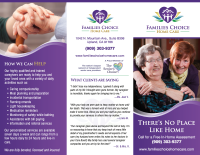
There was a time when nursing homes were the only alternative when aging loved ones required more care than a spouse or family caregivers could provide at home. Thankfully, those days are over.
Today, the combination of assisted adult day care options, assisted living communities, and in-home care makes it possible for aging adults to receive skilled care around the clock.
The Downside of Nursing Homes
There are plenty of excellent, caring nursing homes out there. That said, nursing homes are one of the costliest senior care options on the market, offering the least amount of personalized, human-to-human care for their residents.
As a post on consumeraffairs.com notes, the cons of nursing homes are significant, including:
- High costs
- Risk of poor-quality care
- Loss of freedom and privacy. Nursing home residents sacrifice a significant amount of freedom, privacy, and dignity available to them via other senior care alternatives.
- Visiting hours are at designated times.
4 Nursing Home Alternatives With Heart
These alternatives emphasize the home and keep things much more personalized and heart-centered than any nursing home environment. And, in a world where pandemic shutdowns may be a more common scenario, these alternatives offer far more flexibility in lifestyle choices.
Here are four viable non-nursing home alternatives to consider while creating a long-term care plan for a spouse or family member who requires more support than you can provide at home.
1. Respite care provides primary caregivers with scheduled breaks
Is your drive to consider nursing home alternatives the result of caregiver burnout? Then, respite care may be the first-phase approach to figuring out the right long-term care plan for you. Respite care provides primary caregivers with scheduled breaks that can occur weekly, daily, or overnight. Weekend and more extended stays are also available.
Licensed home care agencies work with clients to establish respite care shifts that fill in the gaps for primary caregivers and ensure a loved one has 24-hour supervision as needed—without you having to do the lion’s share of the work.
Once adequately rested and rejuvenated, you can work with the respite care agency to begin scaffolding a plan for more in-home care services as needed.
BENEFITS: Like other home care alternatives, respite care is dedicated to keeping adults in their homes, surrounded by the familiar sights and experiences they love. Respite care not only optimizes independence and privacy for the senior but also keeps primary caregivers more rested due to a better balance between caregiving and personal time.
Since it’s paid by the hour, respite care is a fraction of the price of other residential senior care options.
2. Home care services to keep seniors in their homes
Home care services provided by licensed home care agencies offer a wide range of services that are personalized to the client’s needs. What may begin with respite care, as explained above, can quickly grow and evolve along with the client and their family’s changing needs.
In addition to having a team of licensed caregivers providing shifts as needed, in-home caregivers offer various services that can be used on an “a la carte” basis. Examples of home care services include:
- Companionship
- Transportation services to and from social and other desired engagements, as well as appointments
- Grocery shopping and errand running
- Meal planning and preparation (including health or memory care-specific meal plans)
- Light housekeeping
- Laundry and linen changes
- Personal care (dressing, bathing, grooming, hygiene care, etc.)
- Toileting and incontinence support
- Transfers to and from chairs, beds, wheelchairs, etc.)
- Pet care
- Overnight and live-in options
Home care providers are also happy to work in partnership with home health teams, so clients have the best of both worlds brought right to the comfort of their homes.
BENEFITS: More than 90% of aging adults prefer the idea of aging in place (USC School of Gerontology). Home care options make that possible, with high-quality care for a reasonable price (and for less than assisted living or nursing home options).
Clients remain embedded in their communities without traumatic transitions or having to re-learn a whole new way of life. Personally-tailored services meet each client/family’s needs.
Two newly launched programs, Medicare Program of All-Inclusive Care for the Elderly (PACE) and Medicaid Home & Community-Based Services (HCBS) waivers make home care a cost-effective option for qualifying households. Home care agencies can explain more about these programs during their free in-home assessments.
BENEFITS: Residents in high-quality assisted living communities appreciate the feeling of a small community with convenient amenities, meals, and access to hobbies/events/and other activities.
Read More: In-Home Care Benefits for Seniors
3. Board & care homes are newer in-home options
All around the nation, residential homes are being transformed into senior Board & Care communities. Typically, they are run by licensed home care agencies or caregivers. Each home may serve four to eight seniors with individual or shared rooms and common areas (living room, family room, kitchen, dining room, etc.)
Residents pay a monthly fee, which covers all of the services offered by the caregivers. Typically, board and care home costs rival assisted living and nursing home fees.
BENEFITS: While loved ones still transition into a new living space, they move to a bonafide residential home. They benefit from social engagement with other residents and the core group of caregiving staff that provide personalized services as needed.
4. Assisted living options offer community…but make sure to read the fine print
Assisted living options are popular with individuals and couples ready to downsize or move somewhere they can live in a community while having easy access to increased support. In addition, seniors and their families appreciate the access to three meals daily, activities, and amenities.
That said, it’s essential to read the fine print regarding monthly versus add-on costs. Most assisted living communities advertise a fairly reasonable “base price” but neglect to advertise the additional charges billed for virtually every service provided by staff (laundry/linen service, meals in rooms, incontinence care, medication reminders, etc.). The price tag can increase exponentially in a short period once residents require more personalized care.
Learn More About Nursing Home Alternatives With Families Choice
Families Choice Home Care is dedicated to helping Inland Empire families learn more about their senior care options. Click below to learn more about home care and nursing home options that align with your aging loved one’s needs and wishes.





